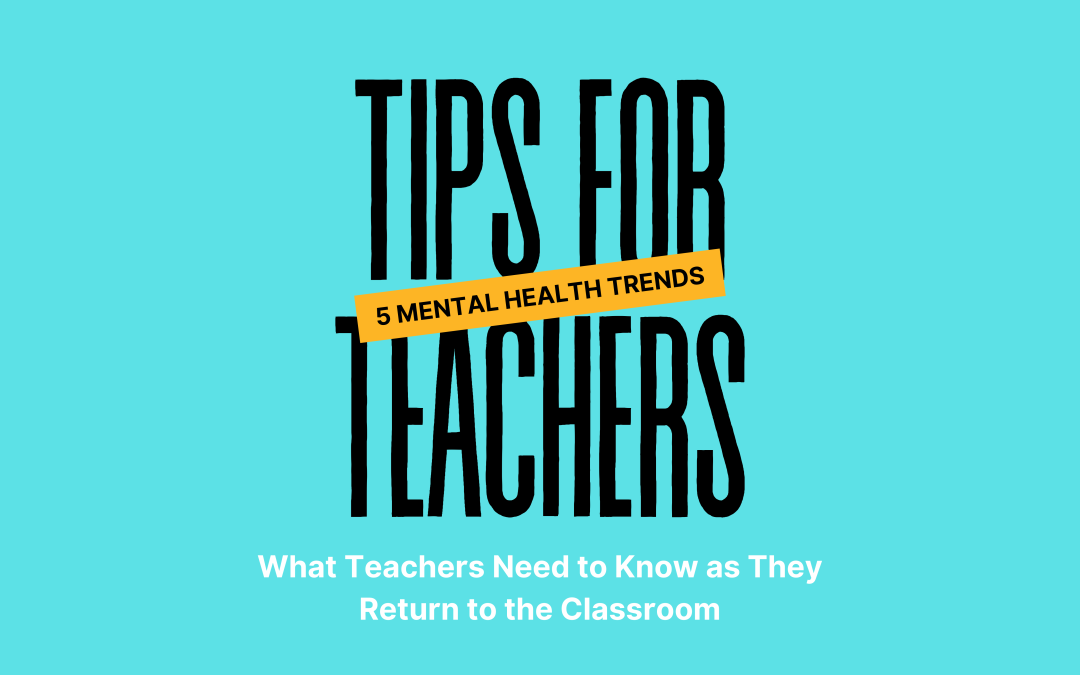Family Houston has been serving the Greater Houston community for more than 100 years and has established itself as a premiere mental health resource for the community. Over the course of almost 4,000 sessions with more than 500 children, ages 3-18, our mental health professionals identified five key trends emerging between July 1, 2022 – May 31, 2023.
Family Houston Mental Health Counselors share their observations, tips, and additional resources for teachers as they prepare for the upcoming school year.
1. Disruptive Behavior in Children
Educators have long struggled with behavior challenges well before the pandemic, but the long-term impact of the pandemic on students’ self-regulation skills is evident. According to the National Center for Education Statistics, 87% of public schools reported that COVID-19 has negatively impacted students’ social-emotional development during the 2021-22 school year. Increased incidents of classroom disruptions include misconduct (56%), rowdiness outside of the classroom (49%), acts of disrespect towards teachers and staff (48%), and prohibited use of electronic devices (42%).
Family Houston Mental Health Counselors have observed that many children need more individualized attention/guidance and the attention they receive for being disruptive becomes a negative reinforcement for them. Often, there are not enough routines at home especially at the start of the school year so adjusting to school can be very difficult.
Tips to Address
- Encourage parents to establish routines around mealtime, homework, and bedtime to create consistency in a child’s life.
- Suggest parents provide healthy lunches, snacks and make sure the kids drink plenty of water.
- Keep very active children busy in a classroom; giving them an important task like leading a line or passing out supplies can help encourage them and remind them they are important and needed in the classroom.
2. Changes in Parent-Child Conflict
Family conflict during the COVID-19 pandemic influenced children’s emotional regulation outcomes. This is seen through significant associations between parent-child conflict, sibling conflict, perceived child stress and children’s negativity. Additionally, we’ve heard from teenage clients themselves that they feel their authority should be equal to their parents and/or teachers. It is not unusual to hear that teenagers don’t feel that they need to follow the rules unless they also agree that the rule is valid.
Family Houston Mental Health Counselors are observing that family dynamics have shifted; some parents have become passive and let their kids/teenagers make many of the rules.
Tips to Address
- Establish rules and consequences from the start of the school year to set the stage and help students know expectations.
- Always remain professional while at the same time being approachable. While it may be appealing to joke around with students and it may make someone appear “cool” this behavior could send mixed messages where students could confuse the student/teacher relationship and could lose respect for their teacher. Also, treating students differently can open the door to future problems and can be taken out of context.
- Treat students with equity; not every child has the same needs. To help avoid future problems and negative reactions, get to know the student and stay attentive to individual needs.
3. Increase in Anxiety and Depression
The residual impact of the COVID-19 pandemic continues to affect us all. Our counselors continue to see an increase in anxiety and depression in both children and adolescents. The number of child and adolescent clients presenting with symptoms of anxiety and depression continues to grow. According to the CDC Youth Risk Behavior Survey, the percentage of high school students who have experienced persistent feelings of sadness or hopelessness has continued to increase. 42% of high school students felt so sad or helpless almost every day for a least two weeks in a row that they stopped doing their usual activities.
Family Houston Mental Health Counselors have seen young adults experience a period of grieving having missed normal high school and college experiences due to COVID-19 pandemic. There is a lack of social skills present due to the extended isolation of being home and the inability to make significant connections is a contributing factor. In addition, many children continue to be exposed to the stress their parents/guardians are feeling which contributes to their own anxiety.
Tips to Address
- Providing a safe environment is extremely important. Safety can be provided by:A. Creating a routine in the classroomB. Showing equal/equitable treatmentC. Providing encouragement and giving praise when someone excelsD. Addressing negative behavior privately
E. Helping guide a child who is struggling academically, helping them if they get stuck when answering a question, for example. - Learning activities help tackle boredom, fear, anxiety. Success and growth help children feel good about themselves and their capabilities.
- Educating students and parents/guardians about mental health and available resources help remove stigmas around talking about mental health.
4. Use of marijuana to cope with stress
The increase in marijuana use has continued to rise throughout the country in general, and a rise in use has been documented in adolescents, young adults, and adults.
Most clients Family Houston Mental Health Counselors see deny that they are dependent on marijuana but do report frequent use. Some report using marijuana recreationally but others report using it to cope with stress or to help them sleep.
Family Houston is not the expert on substance use, we do have contacts in the community that can provide drug education. The Council on Recovery is one of the many agencies that provide support.
Tips to Address
- It can be hard to read the signs that a student is under the influence, but it is important to stay alert and report any behavior that seems unusual
- Never minimize the effects of any drug.
- Don’t judge or make perceptions instead look for possible ways of helping.
5. Lack of Proper Nutrition Due to economic Hardship
The increase in inflation and cost of living continues to impact families and this stress can manifest in children in the classroom. Parents are still concerned that they can’t afford to pay bills and that money will run out. Understanding that some behavior could be attributed to a lack of nutrition or financial worries can be a first step to referring the child for services.
Nutrition is an extremely important factor and sadly some kids look forward to their school lunch as their best meal of the day.
Tips to Address
- Stay observant, attentive, and approachable in and outside of the classroom. You might be the one person a student trusts and will go to in a time of need.
- Have resources available for families in need; contact the Guidance Counselor or leadership in your school for resources available for families in need.
- Reach out to Family Houston to learn more about our community support services. Programs like Kids ’Meals provide free, healthy meals to homes of children age 5 or under within designated zip codes. If we are not able to help, we can refer you to a partner agency to provide services.
Family Houston: Helping Others Help Themselves
Family Houston aims to create a stronger community for tomorrow by helping individual and families meet the challenges they face today. We provide services in three key areas: Mental Health: Counseling, Financial Stability, and Community Support Services. Family Houston’s counselors, financial and employment coaches, and community support specialists help strengthen families – leading to a healthier, more stable community.

